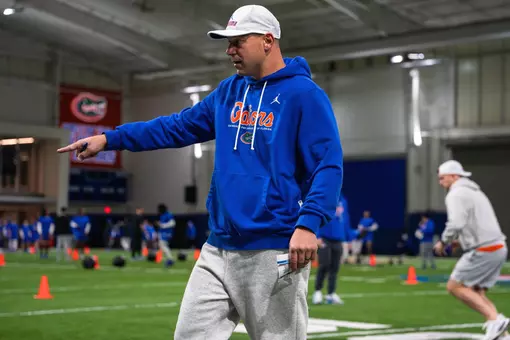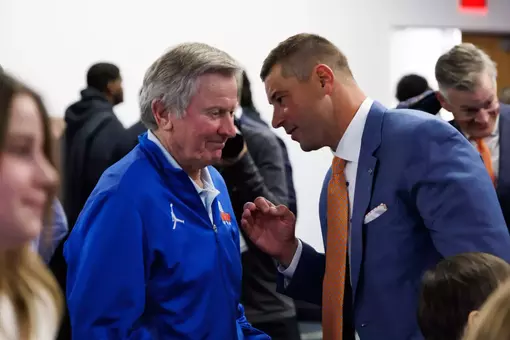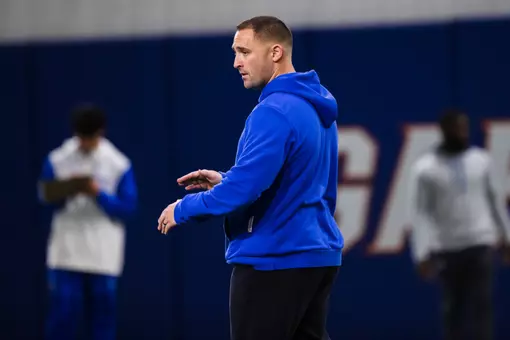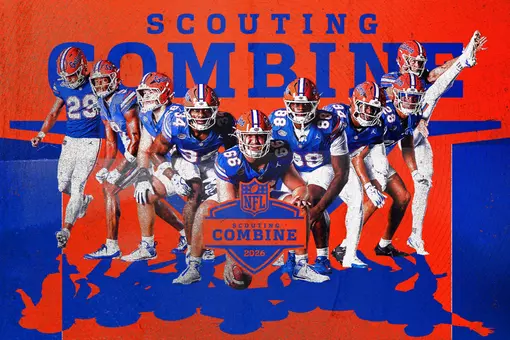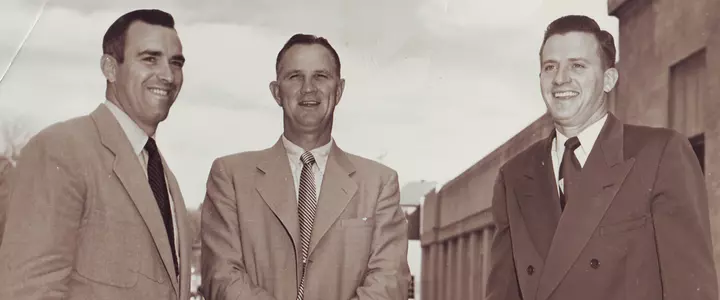
Gator Talk - Strange Tales of Gator Coaches
Sunday, November 14, 2010 | Football
By Norm Carlson, Assistant Athletics Director/Gator Historian
The saga of head football coaches at Florida includes a man who was also the starting fullback and had already completed his college playing career at Clemson. Add a coach who was attending the UF Law School, another who was an ROTC commandant, and there was also a future member of the Nuremburg war crimes tribunal who coached the Gators.
The list also includes a coach who escaped from a Cuban courtroom, a future military genius who took his team on a month-long train trip to play top teams around the nation, a future College Football Hall of Fame selection for what he did elsewhere and another who lost his first dozen contests at UF.
This list also includes the only Heisman Trophy winner to coach a Heisman Trophy winner in the collegiate ranks, a star quarterback from Gainesville who led Florida to its first bowl game, a future college dean and a man who described himself, correctly, as “the rhetorical equivalent of a blocked punt.”
It is part of the interesting Gator coaching landscape that also includes some of the shining stars in the college coaching world, the latest of whom is Urban Meyer.
Florida's first head coach was Jack (PeeWee) Forsyth, a star fullback at Clemson. At Florida, he was the coach/fullback from 1906-08. He briefly quit in 1907 and played semi-pro football in Jacksonville because UF wasn't paying his $500 salary.
News accounts said that his team was hampered by a lack of size and by dissention and disbanded midway of the 1907 season following a 27-2 beating by the Savannah Athletic Club.
During the Christmas holidays in 1912, the Gators went to Havana, Cuba, to play games against Vendada and the Cuban Athletic Club. They beat Vendada, 27-0, but got into a fight over the rules in the game against the CAC. Gator coach G.E. Pyle was arrested, taken to a Cuban judge and ordered to take his team and get out of town before he put them all in jail.
William Kline posted a fine 19-8-2 mark while attending UF Law School from 1920-22, and entered private practice upon graduation.
With Kline's departure, Major James A. Van Fleet, commandant of the ROTC program at Florida, was talked into becoming the head football coach in 1923 and the former West Point star lineman responded by posting a record of 6-1-2 that season. It ended with a 16-6 win over unbeaten and Rose Bowl-bound Alabama in the final game. He coached the 1924 team to a 6-2-2 record and then was transferred to another military assignment. He was a four-star general and hero during World War II and the Korean War.
Harold Sebring, a key Van Fleet assistant, took the reins and led the Gators to an 8-2 mark in 1925 while also attending law school at UF. Three years later, he graduated and entered the law profession in Miami. Sebring went on to become a judge in the Nuremberg Trials after World War II, and then dean of the Stetson Law School.
Charles Bachman, coach of the great 1928 team with an 8-1 record, went on to Michigan State in 1933 and became a College Football Hall of Fame member for his work.
Dutch Stanley, a standout player at Florida in the 1920's, was head coach of the Gators from 1933-35 before starting a lengthy career as dean of the UF physical education college. Raymond (Bear) Wolf inherited a bad situation in 1946, losing his first 12 games. He departed after the 1949 season.
Bob Woodruff became head coach and athletic director in 1950 and righted the school's program. When he left after the 1959 season, the Gators were on sound footing financially and in SEC competition. Woodruff, not known for his public speaking, dubbed himself “the rhetorical equivalent of a blocked punt.” And he was correct. However, he was an exceptional leader with great insight.
Doug Dickey, a Gainesville native who quarterbacked the Florida team to its first bowl game in the 1952 Gator Bowl, came back as head coach of the Gators from 1970-78. Steve Spurrier, UF's head coach from 1990-2001, became the only head coach in college history to win a Heisman Trophy (in 1996) and coach a Heisman Trophy winner (Danny Wuerffel in 1996).
